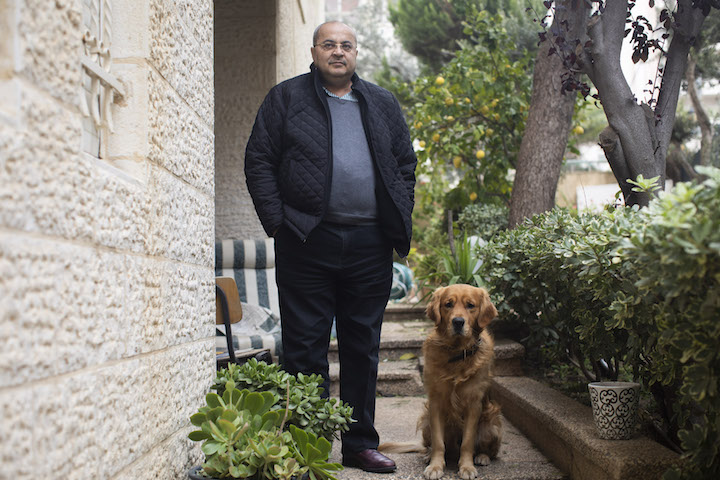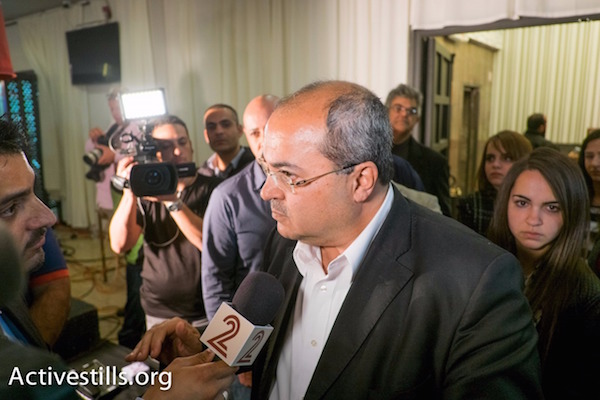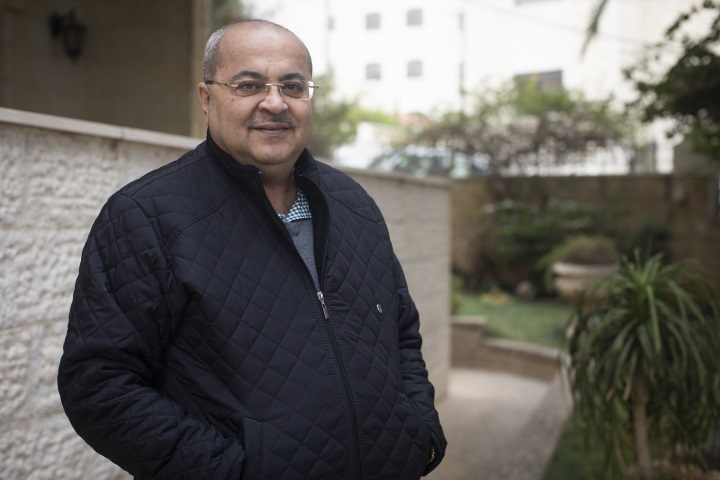Ahmad Tibi’s recent announcement that he would split from the Joint List has rattled Palestinian citizens. In an interview, he speaks about the successes and failures of the list, why his party would be better off alone, and why he may join forces with Israel’s centrist leaders.
By Meron Rapoport

Four years after it was established, the Joint List, which succeeded in uniting Israel’s Palestinian parties, is on its way toward dissolution. Dr. Ahmad Tibi, who heads the Arab Movement for Renewal faction, also known as Ta’al, made a surprising announcement last week, declaring he would run independently in the upcoming elections, set for April 9. The reason stems from Tibi’s position in the Joint List, which also determines how many seats his faction is allocated. It is possible, however, that the decision reflects a deeper rift in Palestinian society in Israel.
Tibi, a gynecologist born and raised in the city of Taybeh, appeared on the political scene following the Oslo Accords in 1993, when he was appointed to be Yasser Arafat’s advisor on Israeli affairs. He appeared in the Israeli media and came to symbolize — especially in the eyes of the Jewish Israeli public — the relationship between Palestinian citizens of Israel and the PLO. In 1995 he established Ta’al, although he has never run alone in elections, always pairing up with the other Palestinian parties, including Hadash, Balad, and the Islamic Movement.
Even today he remains the Palestinian politician with the most face time in the Israeli media, possibly the reason he has gained so much favor among Palestinians in Israel. Polls published since he announced his departure from the Joint List show him clocking in at six seats Knesset seats — the same number that all three remaining factions comprising the Joint List would receive should they run collectively.
Tibi sounded unwavering in his decision to run independently when I sat down with him in his home in East Jerusalem, convinced that he could easily pass the 3.25 percent election threshold. On the other hand, he does not reject the idea of the Joint List outright, and sees the advantages of united political representation for the Palestinian public. He only demands that that public have a say on the makeup of the list — and who leads it.
Tibi also sees advantages in going solo. Not only because he believes that competition between the various parties will increase voter turnout, thus bolstering the power of the Palestinian community in the Knesset, but also because he has set a goal for himself: to be part of a political alliance that would block the establishment of a right-wing government and would allow the establishment of a minority government.
Tibi wants “influential” Knesset members on his side — not members of Knesset who merely sit in the opposition. From speaking to him, it seems he has been in talks with center-left politicians such as Yair Lapid. Running alone will make establishing such a bloc easier, he believes. Tibi fondly recalls the alliance Prime Minister Yitzhak Rabin forged with two Arab parties back in 1992 — the first and last time in Israeli history in which the Palestinian public had representation in the coalition.
What Tibi is saying makes political sense. Despite his combative image among the Jewish public in Israel, it’s easier to see him finding common ground with Lapid or former IDF Chief of Staff Benny Gantz than with Balad, which champions turning Israel into a state of all its citizens, the Islamic Movement, or even the Socialist Jewish-Arab party, Hadash.
Above all, Tibi is a skilled, veteran interviewee, often making it difficult to truly know what he is truly thinking. There is plenty of time until February 21, when all the parties send their finalized list of candidates. Everything is still possible.
“There was no Joint List for 60 years, and Hadash preached a very logical, rational, and democratic idea: two lists is both pluralistic and increases competition as well as voter turnout,” Tibi says. “Our biggest rival is apathy and the gradual decrease in voter turnout. In 2015 Liberman raised the election threshold forcing the four parties to join forces. In addition, the Arab public itself supported the idea of uniting.”
What did the Joint List accomplish in four years?
“It had its victories and failures. There was a torrent of racist laws. Some of them we were able to block and some we were not. Take the Jewish Nation-State Law. We were unable to stop it; the entire opposition was unable to do so. Fifty-five MKs voted against it. Anyone who thinks that the 13 members of Knesset of the Joint List were supposed to put their bodies on the line — despite our relatively small numbers — to block the passing of a law that had the support of the entire coalition, not to mention Netanyahu himself, is living in a fairytale. We struggled and we did not succeed. But we struggled.”
“Another law that angered the Arab public was the law to stop the Muslim call to prayer. It incensed Arabs here as well as in Pakistan and the United States. Through my dialogue with the ultra-Orthodox parties, we were able to freeze the law. That was a success.”
Tibi debunks what is often perceived as one of the Joint List’s greatest successes – Government Resolution 922, a five-year economic development plan for the Palestinian community in Israel, to the tune of between 12 and 15 million shekels. “The claim that members of the Joint List stand behind Resolution 922 is wrong and deceitful,” Tibi says, taking a stab at Joint List Chairman Ayman Odeh, who views the plan as a personal success.

“The plan needs to be named the ‘Amir Levi Plan,’ after the previous Director of Budgets at Israel’s Ministry of Finance who believed in the integration of Arabs into the economy. He held talks with the Joint List and heads of the local councils, [but] the resolution was pre-planned. The Arab politicians managed to add hundreds of millions of shekels to it. The most effective tool they had was threatening a shutdown of the Arab councils. Levi called me twice and asked me to avert the shutdown. The key player then was Mazen Ghaneim, the head of the National Committee of Heads of Arab Local Authorities. He was the one who threatened the shutdown.” That Tibi mentioned Ghaneim by name is no coincidence — the two recently appeared at an event together.
Another victory often ascribed to the Joint List is the transformation of the status of the Palestinian minority in Israel into an international issue, especially in the wake of the Jewish Nation-State Law. “There are those who say the Joint List internationalized the issue of the Arab minority,” he says. “This, too, is not precise. I was at the United Nations, the White House, the UN Human Rights Council, and the European Parliament way before the Joint List was established.”
Things look different when the people who go to those meetings are representatives of close to 90 percent of the Arab minority in Israel.
“I have no doubt that when we arrive together, all of the political factions, all the parties, it is more effective and representative. We can come as representatives of the Joint List, and we can come as representatives of the parties that represent the Arab public.”
What is more effective?
Both of them. There is no difference in my eyes.
What about the message you are sending the Palestinian public? After four years, you are unable to reach an agreement on issues that revolve around representation.
“I would prefer that we reach an agreement about representation in a democratic and reflective manner rather than treating it as a matter of business. I will never take dictates from anyone about the degree to which I am represented. There are those who spoke against me, saying that my party never runs alone in elections. Well now it is! Those same people are now attacking me for that decision.”

Tibi’s main demand is to hold open primaries for both the position of chairman as well as the general makeup of the Joint List. “The public needs to be a partner to putting together the list. This will lead to the rehabilitation of the perception of the Joint List in the eyes of the Arab public, which views it far less favorably today. And if that is happening, we must examine why.”
Why do you think it’s happening?
“Internal conflicts, the fact that we are facing the most extreme government does not exactly help us as a collective to achieve strategic achievements. The claim that we are the third largest list in the Knesset gave the public false hopes.”
Do you want to be in the coalition?
“No. I am opposed to being in the coalition. In the coalition, there is a collective responsibility for the deeds of the government, even if I oppose it. How can I be in a coalition if it bombs Gaza, transfers money to the settlements, or demolishes homes? But I will lead the attempt, through my party, to establish a political bloc to thwart a right-wing government in the upcoming elections, which in my opinion, will be the largest party [of all the Arab parties — M.R.]. In exchange, I will demand a 10-year plan of NIS 64 billion for the Arab public, alongside the establishment of a new Arab city, an Arab university, a hospital in an Arab community, land allocations and planning and construction issues.”
You are willing to join a political bloc with Lapid or Benny Gantz?
“No names. My top priority is to replace Benjamin Netanyahu and the right-wing government because it is a catastrophic government. Rabin was not exactly a vegetarian — he too was the former IDF Chief of Staff — and yet the Arab parties entered a political bloc with him [to form a minority government — M.R.]. That was an interesting and positive period.”
Have you spoken to either Lapid or Gantz about that possibility?
“I don’t know Gantz or his political positions. I know Yair Lapid.”
Can such a bloc be formed?
“It all depends on the results. If there is an Arab party that says it is not waiting for another opportunity like in the 90s, then it either does not understand politics or it is making a mistake and being deliberately deceitful. I hope we reach a situation in which our numbers and political power match what we had in the 90s.”
One of the people rumored to be tied to your list is Ali Salam, the mayor of Nazareth. Many criticize him for promoting a kind of politics that demands budgets and forgoes national issues. You, on the other hand, were an advisor to Yasser Arafat.
“I know the demands of the heads of the local councils; they want to succeed at their jobs and they want government offices to provide them with budgets. This is legitimate. But it is only part of our identity. Our national identity is cardinal and important, that is why I am the head of Ta’al. Ta’al will proudly wave the flag of social and distributive justice, as well as the national flag and will bolster of our national identity.”
Sociologists divide Arab-Palestinian society into “Israeli Arabs” who want to be part of Israeli society and are less interested in Palestinian identity, and “Palestinian citizens of Israel,” where Palestinian identity is more prominent. Will your list tend more toward the former?
“I reject this question. No one will teach me about national identity. I am a representative of the Palestinians in Israel, and I do this with pride. I did this on the Knesset podium, on the podium at the UN, and in Tel Aviv when I drank espresso with your friends. I am the man who is constantly attacked by the right because they accuse me of ostensibly emphasizing identity or Palestinian nationality. I am proud to be Palestinian, and if I were not Palestinian I would choose to be born Palestinian.”
Tibi admits that holding open primaries so close to the elections is problematic, which is why he suggests a few different parameters for electing representatives of the Joint List. The first is to conduct three surveys (“the three other factions will determine the questions and the institutes to carry them out, and I promise to accept the results”), while the second is to assess the achievements in the last local elections (according to Tibi, 14 of the elected local council heads belong to or support Ta’al). The third parameter is to conduct a survey among younger Palestinian citizens regarding what they want to see happen in the Joint List, while the fourth is an assessment of parliamentary achievements.

Tibi says he is not the only one who determines his feelings vis-à-vis the Joint List according to his placement in the list. “If you come to Hadash and tell them: ‘The Joint List is a historical achievement, but you will not lead it, since the head of the Islamic Movement wants to be chairman,’ Hadash will say that this is a red line and there won’t be any more Joint List.” The same thing, says Tibi, goes for the Islamic Movement or Balad. If the number of seats allocated to them is cut they will prefer to run independently of the Joint List. “All of a sudden it ceases to be an important and representative enterprise,” he says sarcastically.
The election threshold is high. You need 150,000 votes to pass it. Are you not afraid those votes will be tossed into the trash?
“We passed [the threshold] long ago and we will pass the 150,000-vote mark. I am not worried. Our party will be the strongest one. And I want all the other competing parties to pass the election threshold — I don’t want anyone to fail.
“In one of our faction meetings, my colleagues Ayman Odeh and Aida Touma-Suleiman said that Netanyahu wants the Joint List to remain as it is, since he views its 13 Knesset seats as insignificant when it comes to influence, whether in the coalition or the opposition. The truth is he is right.”
Do you think you will break that equation?
“I do not only want more MKs, I want MKs to have more influence. I have proven that it is possible to break barriers by passing laws or transferring budgets to the Knesset Finance Committee. What I’m trying to say is: it’s also possible to do things differently.”
Will this be your election slogan?
“No, it is the slogan of this interview with you.”
Meron Rapoport is an editor at Local Call, where a version of this article first appeared in Hebrew. Read it here.
